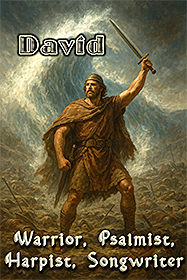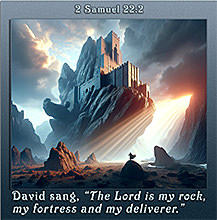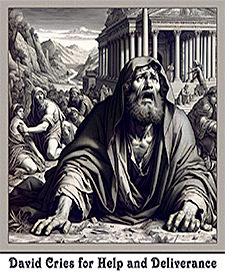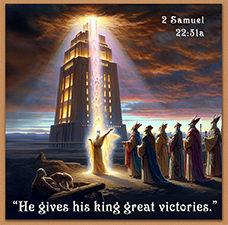2 Samuel 22:1–51 . . . Bible Study Summary with Videos and Questions
“David’s Praise Song to Yahweh”
The unknown author of the book(s) of Samuel provides in chapters 21–24 the epilogue or appendix to it. In its center we find two praise songs or psalms — found in all of chapter 22 and at the start of chapter 23 — in which David, the premier songwriter of all time, sings songs of praise and thanksgiving to God for delivering him from his enemies. In each, he articulated the deepest convictions of his heart, for and about God. These convictions were the basis of his greatness, which account for God’s blessing of him. It’s long been recognized that chapter 22 isn’t simply one of the oldest major poems in the Old Testament but, because Psalm 18 parallels it almost verbatim, it’s a key passage highlighting David’s song of salvation as being the essence of praise bestowed on Yahweh.
David wrote this psalm to commemorate the end of the constant stress and conflict that characterized his life during the five or six years that he was a fugitive from Saul. Note that in this psalm, “LORD” is prominent (18 times in the NIV), rather than the generic word “God” (Hebrew el, 10 times), usually as “my God” to whom he related personally. “LORD” (often expressed in small caps like this in our English Bibles) represents the Hebrew word Adonai, which was substituted for the divine name when pious Jews read the Hebrew Scriptures, so as to keep them from breaking the Third Commandment and misusing God’s revealed name: Yahweh (Exodus 20:7).
[Note: Click the link to This Week’s Passage near the bottom of this page to read today’s Scripture.]
Introduction (2 Samuel 22:1–3)
David’s Song of Praise
22 1David sang to the Lord the words of this song when the Lord delivered him from the hand of all his enemies and from the hand of Saul. 2He said: “The Lord is my rock, my fortress and my deliverer; 3my God is my rock, in whom I take refuge, my shield and the horn of my salvation. He is my stronghold, my refuge and my savior — from violent people you save me” (2 Sam. 22:1–3).
Chronologically speaking, David’s song of thanksgiving herein belongs earlier in David’s story, closer to the beginning of the book. In the first verse of David’s praise psalm, we’re given its historical background: He wrote it after God delivered him from the hand of his enemies as well as of Saul. It would seem then that it was written shortly after Saul’s death, at the outset of David’s reign as king. From this vantage point of occupying the throne, he reflected on Yahweh’s gracious dealings in David’s life to fulfill God’s promise that he’d become Israel’s king. David’s problems didn’t end with Saul. A roller-coaster ride filled with war, death, family rivalry, and suffering would mark his days. And as his circumstances changed, so did his character. Faithful one minute, unfaithful the next. God’s character, however, did NOT change. He was David’s rock during a lifetime of shifting sand.
Throughout his song, David described God with adjectives and metaphors of consistency and strength. By using the metaphors “my rock, my fortress, and my deliverer,” David describes Yahweh as the foundation of his security (rock), the one who shelters and defends (fortress), and the one who rescues from danger (deliverer). His song/psalm begins by praising God for who He is — his refuge. Employing a handful of symbols, David speaks of God as his place of safety: David’s rock or lofty crag (v. 2). He exemplified the strength and stability of natural rocks in vv. 2–4, similar to those he’d inhabited in the Judaean wilderness when Saul was chasing him. David’s language points to Yahweh’s reliability and unchanging power, portraying Him not merely as a distant deity, but as an actively present protector and savior for those who trust Him.
God was David’s “fortress” and his “stronghold.” He was also his “shield” and “horn of his salvation.” These aren’t mere images but are the actual means that God employed to save David’s life from his enemies. At the start of his praise song, David urges us to look behind those means that God employed and focus on God himself. After all, it’s God who delivers; he’s our protector and deliverer, our place of safety.
David’s Cry for Help; His Deliverance from Danger (vv. 4–20)
Based upon the truth that God was David’s refuge (vv. 2–3), and the truth demonstrated in God’s various acts of deliverance (vv. 5–20), v. 4 sets down a principle. David didn't merely say, I called upon the LORD . . . and he saved me. In effect, he said, Whenever I called upon the LORD for deliverance, he saves me. He then went on to describe in dramatic imagery the danger he was in (vv. 5–6). What a wonderful description of the terrors of death! He used the imagery of waves and waterfalls, and ropes and snares, like those you’d use to trap a bird or animal. He highlighted the deliverance that God had brought about for him in vv. 8–20, and, in his terror, David called upon Yahweh; from his Holy Place, God heard David and responded to his cry for help (v. 7).
David employed the imagery of dangerous waters to describe the way his life had been threatened by his enemies. First, he described himself as a man drowning in rough seas, not unlike Jonah. Then, the imagery changed from drowning in rough seas to being swept away by floodwaters (v. 5). He described how close he was in terms of the cords of the grave (“hell” rendered in the KJV) wrapping themselves about him, and the snares of death confronting him (v. 6). With his last breath (or with his third time going under as it were), David tells us that he called out to God for deliverance. From His dwelling place, God heard his cry.
Next he described his rescue by God using the imagery of a manifestation of God to man. He called to God for deliverance; God responded in a way that signaled His sovereignty over all creation. God was angered by the enemies who’d endangered His anointed king, and all creation reflected God’s anger. This isn’t simply a description of God being eager to save His king. It describes and documents a God who’s intent upon destroying those enemies who attempted to threaten His king.
We should see in vv. 8–12, David’s description of Yahweh’s response to his prayer; it’s graphic and powerful. Whoever his opponents were, they didn’t plan on confronting the Almighty God himself! The first indication of divine intervention is that of an earthquake (v. 8). Smoke then proceeded from God’s nostrils; the fire that came out of His mouth consumed anything in its path; coals of fire were kindled by it (v. 9); as God descended, the heavens bowed down and He stood upon thick darkness as an ominous foretaste of things to come (v. 10); as he rode on the wings of the wind, thick clouds and darkness surrounded Him while a white-hot brightness radiated ahead of Him (vv. 12–13).
In vv. 13–16, Yahweh confronts David’s enemies, attacking them with God’s effective weapons: bolts of lightning shot out like arrows, deafening thunder, mighty wind (vv. 14–15). Upon His approach, the seas parted and the land below was exposed at His rebuke and the blast coming from His nostrils (v. 16). God reached down, plucked His servant from the waters, delivered him from his strong enemy, and set him down in a spacious place on solid ground. Though David’s enemies were stronger, God delivered him from their hand.
Yahweh went on to rescue David. We see next how David moved in his psalm from “dramatic and poetic” to “personal and intimate.” He knew what it was to have been rescued by Yahweh. Having faced Saul’s 3,000-man army, David sung how God personally reached down, took hold of him, and set him down in a “spacious place” that was free of danger. The reason? God’s pure grace: “He delighted in me” (v. 20). David was a man after God’s own heart (1 Samuel 13:14; Acts 13:22). He’d seen such awesome deliverance brought about by Almighty God.
The Foundation for David’s Deliverance (vv. 21–28)
Herein, David highlights his righteous path before Yahweh. This psalm was written before David’s grievous sin regarding Bathsheba and Uriah. At this point, David understood that Yahweh had delivered him because of his desire to live a righteous life. But, later, when David became blood-guilty, it was different; he had to rely solely on God’s mercy, just as we hearty believers, today, must trust in the grace of God through Christ Jesus’ cross.
When God gave Israel the Law of Moses, he made it clear that obedience to his Law would bring blessing (Deuteronomy 28:1–14), while disobedience would bring cursing and disaster (28:15–68). With few exceptions (see 1 Kings 15:5), David loved and lived by the Law. He understood that those who’d draw near to God were those who’d keep his Law. See what he wrote in Psalm 15.
David believed, as did all faithful Israel, that God would punish the wicked and save the righteous who’d take refuge in Yahweh. In the Law of Moses, God made it clear to His people that He’d bless them when they trusted in Him and kept His law (see Deut. 7:12–16). On the other hand, it was also clear that their righteousness, attained by their works, wouldn’t be the basis for God’s grace (Deut. 9:4–6). David didn’t forget that he was a sinner who needed forgiveness and grace. He understood that God saves the righteous while condemning the wicked. It’s for that reason that God heard David’s cry for help and came to his rescue from his wicked enemies. Then and today, God not only saves the righteous, he saves the afflicted while condemning the proud.
You ought to see in vv. 26–28 that Yahweh’s salvation was made available to those who trusted in Him, through moral integrity and humility — not through social standing or might. David’s song of praise reveals that God’s saving help is given personally and proportionally, reflecting His just and merciful nature toward those who walk faithfully. To David’s credit, when he confessed his sins, he approached God from a “broken and contrite heart” (Psalm 51:17). His heart had become cleansed and he humbled himself; as a direct result, he was saved.
Divine Enablement to Defeat Enemies (vv. 29–46)
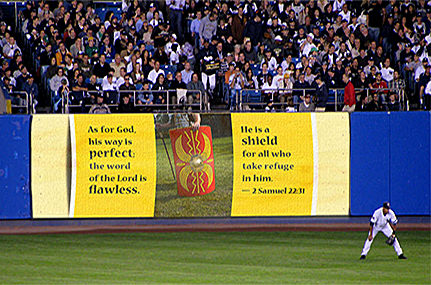
Click to enlarge and download Warren’s custom image:
“God is a shield for all who take refuge in Him.”
— 2 Samuel 22:31 —
Because David experienced “the God of miracle deliverance,” he realized through Yahweh that he could do anything. His trust in the LORD soared! His confidence wasn’t in himself but in Him. With Yahweh at his side, David could do anything vv. 29–37!
To review, David praised God for being his deliverer and refuge (vv. 2–3). Whenever he called upon God for help, God heard and answered (v. 4), revealing his holiness and anger toward the wicked who opposed (a) his servant and (b) his sovereign power (vv. 5–20). God rescued David from his enemies because of his righteousness and their wickedness (vv. 21–28). Because salvation comes from the LORD, we might presume that we’re not a part of the process. Are we to sit by idly, watching God do everything? Often, God will have us play a role in His deliverance by giving us the strength and ability to prevail over our enemies. David stood up to Goliath and prevailed, but it was God who enabled that victory. In vv. 30–46, David speaks of the divine enablement that allowed him to stand against his enemies and prevail.
Today, God’s strength isn’t added to our strength; it comes in place of our weakness. It’s why David began this passage with, “You, LORD, are my lamp; the LORD turns my darkness into light” (v. 29). God enlightened David’s darkness by strengthening him in his weakness. David described the strength that God supplied him in terms of waging warfare, enabling him to leap over a wall, crush or overrun a troop of men (v. 30). Military strength starts in the mind. David had the moral courage to stand up to Goliath and the God-given skill to strike him down with his sling. The basis for this courageous strength — faith — in God’s Word, David’s source of faith; it enabled him to fight. His flawless Word also teaches us about God, our rock, shield, and refuge (vv. 31–33). He not only gave David military advantages but gave him sure-footedness that enabled him to fight (v. 34). God trained David’s hands for battle, giving him the strength to bend the difficult bronze bow (v. 35). He gave him the shield of God’s salvation, then firm footing on which to stand and fight (vv. 36–37).
All of this enabled David to pursue his enemies successfully, causing them to turn and run (v. 38). They didn’t escape, because God enabled David to crush, beat, pound, trample, pulverize (v. 43) those who opposed him. Some of his enemies, possibly many, appeared to be fellow Israelites; but his enemies and his allies also included non-Jewish Gentiles. In the closing verses of this psalm, the Gentiles had become more prominent. Delivering David from his own people’s disagreements (v. 44), God also struck fear in the hearts of the Gentile nations. As a result, God not only established David as king over Israel, He kept him as head over Gentile nations made up of people who feared David. If their submission to him wasn’t genuine, they at least faked allegiance to him (vv. 44–45). They’d all lose heart and come trembling to him from their fortresses (v. 46).
After David praised the God who’d enabled him, he explained in vv. 38–43 how thoroughly he’d vanquished his enemies. He probably wasn’t thinking of Saul here, but of the Amalekites, perhaps the Philistines. Then in vv. 44–46, he, who began as a humble shepherd, had become — through Yahweh’s enablement — an emperor and “head of nations,” with vassals subject to him, obeying his commands. He marveled at God’s amazing and unlimited power.
David Praises God for His Deliverance (vv. 47–50)
David concluded this first of two psalms with a personal note, thanking God who’d anointed him king, bestowing upon him an eternal dynasty that culminated in the appearance of Jesus the Messiah, the Son of God.
Realize in these four verses that God was David’s refuge and defender. When he called for help, God heard and helped him. He moved heaven and earth to bring requisite help to David, at times strengthening him so he could oppose and overcome enemies. . . But, who were David’s enemies? And with whom was he to praise God? Self-righteous Jews would have a quick answer: The Jews are David’s friends; they’ll join him in worshiping God. The non-Jewish Gentiles are God’s enemies; they deserve to be pulverized. But that’s not at all what David said in this psalm. He clearly indicated that: (1) a number of his own people were enemies (see v. 44a); and (2) people from the nations who submitted to him would worship God with him (see v. 44b). The clearest statement comes in v. 50:
“Therefore I will praise you, LORD, among the nations;
I will sing the praises of your name” (2 Sam. 22:50).
Bottom line: Was God David’s deliverer? His refuge? Yes. But He was also the deliverer and refuge of all who trusted in Him, including the Gentiles. All those who chose to set themselves against God’s king (David, or the Messiah) were the enemies of God who’d be pulverized by God’s king.
God Save the King (v. 51)
The psalm ends with praise for Yahweh who lives! In this concluding verse, David’s declaration is full of hope and anticipation. He was God’s anointed king, but his reign was about to end. God had proven to be David’s “tower of deliverance.” But more would come because of the covenant God had made with David: the promise that his throne would be an eternal throne. See that in 7:16: “Your house and your kingdom will endure forever before me; your throne will be established forever.”
Was David safe and secure because God was his refuge? Yes. In this final verse, David revealed that his confidence and security would be long-lasting, beyond his lifetime. Because God had shown him lovingkindness, he’d also show it to David’s descendants, making such blessings eternal. God not only kept his promise to David, protecting him from those who sought to destroy him while establishing his throne, God also installed the One who continuously fulfills the Davidic Covenant: God’s anointed One, the Messiah.
Isn’t it interesting that the author of 2 Samuel placed David’s praise psalm at the end of the book. The words were true, not only before his forty-year reign, but after it. David’s change in circumstances and character didn’t manifest into a change in God’s character. Do you wonder how often David might have reflected on the words that he’d written that thanksgiving day? Perhaps, in his darkest nights, he clung to what he knew to be true of God previously, even if it didn’t feel true in his present moment.
In the midst of life’s changing waters, we’ve certainly been pulled out of the challenging depths. That’s a consistent truth. As a result, this question inevitably comes to mind: What aspects of God’s character might I sing about today, right now?
† Summary of 2 Samuel 22:1–51
This long chapter contains David’s song of praise to the Lord, offered after God delivered him from all his enemies, including Saul. The song, nearly identical to Psalm 18, opens with vivid gratitude for God’s protection, describing the Lord as David’s rock, fortress, deliverer, shield, and stronghold (22:1–4). David recounts calling on God in distress, and God’s powerful intervention — displayed in dramatic, poetic imagery — rescues him from danger and overwhelming adversaries (vv. 5–20). He testifies to God’s faithfulness and justice, acknowledging that his deliverance is rooted in both God’s character and David’s integrity, while also affirming that God deals mercifully with the humble and opposes the proud (vv. 21–28).
The latter part of the chapter celebrates God’s ongoing guidance, victory, and establishment of David as king. David praises God for granting him strength, making his way blameless, and empowering him to defeat enemies (vv. 29–46). The narrative emphasizes that the lordship, victory, and honor that David enjoys ultimately belong to God. David finishes his song with a commitment to publicly thank and praise God among the nations, recognizing that God’s steadfast love continues for David and his descendants forever (vv. 47–51).
Key points with verse references:
• David begins his song by proclaiming that the Lord is his rock, fortress, deliverer, shield, and savior, the one who rescues him from violence (vv. 2–4).
• In his distress, David calls on God, who responds with mighty and vivid acts, delivering him from powerful enemies and setting him in a safe place (vv. 5–20).
• David attributes his deliverance to God’s justice, explaining that God rewarded him “according to my righteousness” and “cleanness of my hands” (vv. 21–25), yet recognizes this righteousness comes from God’s forgiveness.
• The Lord equips David with strength and victory, making his way secure, subduing nations under him, and exalting him as king (vv. 29–46).
• David concludes by exalting the living God, promising to give thanks “among the nations,” acknowledging God’s enduring mercy to him and to his descendants forever (vv. 47–51).
The passage stands as a testimony to God’s saving power, covenant faithfulness, and the personal relationship David experienced with his Redeemer.
This Week’s Passage
2 Samuel 22:1–51
New International Version (NIV) [View it in a different version by clicking here; also listen to chapter 22 narrated by Max McLean.]
Summary Video: “The Second Book of Samuel”
† Watch this introductory video clip created by BibleProject on bibleproject.com.
- Q. 1 What do you find the most inspiring in the language of this psalm?
- Q. 2 Which of the psalm’s verses encourage you the most?

